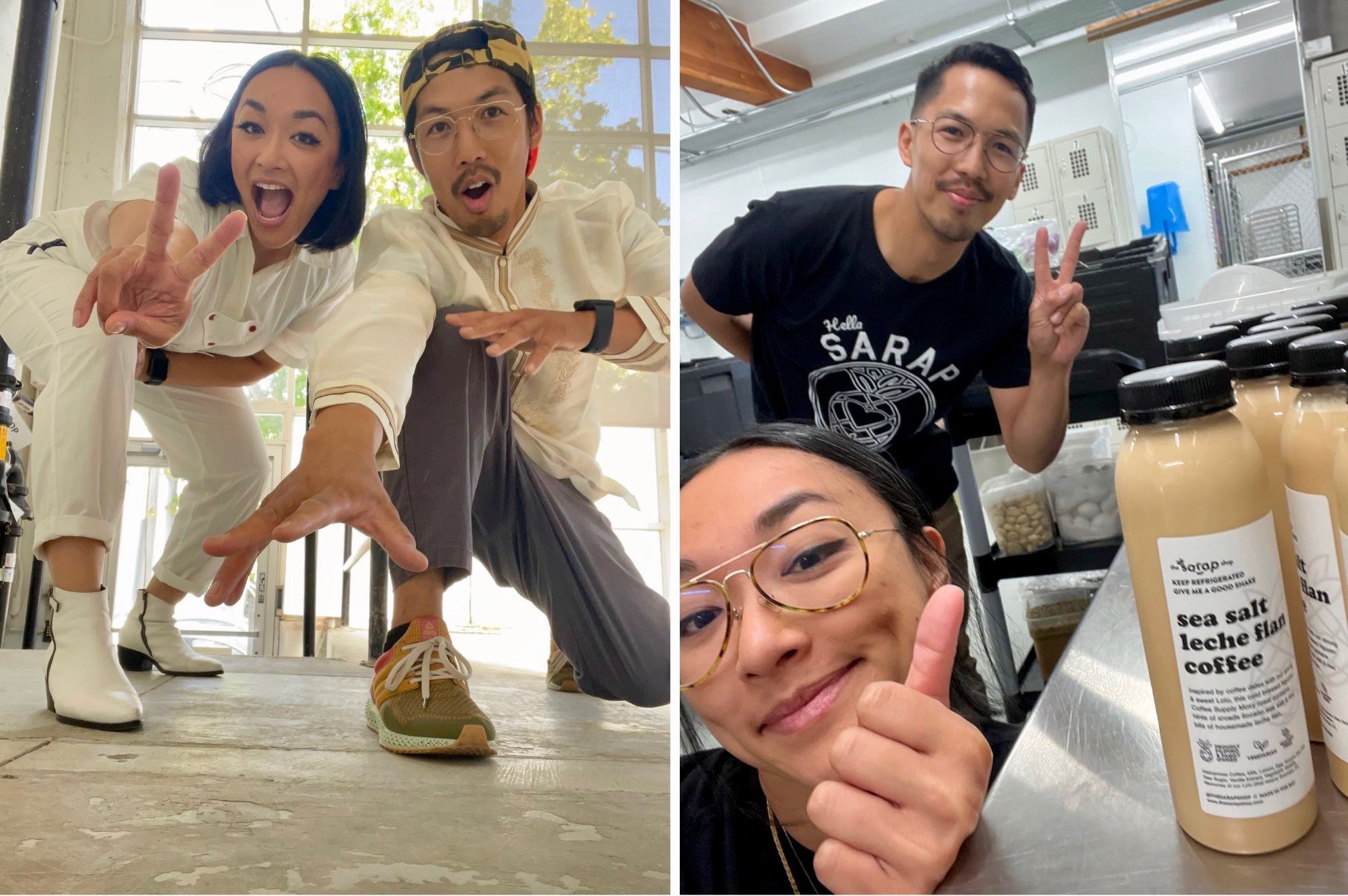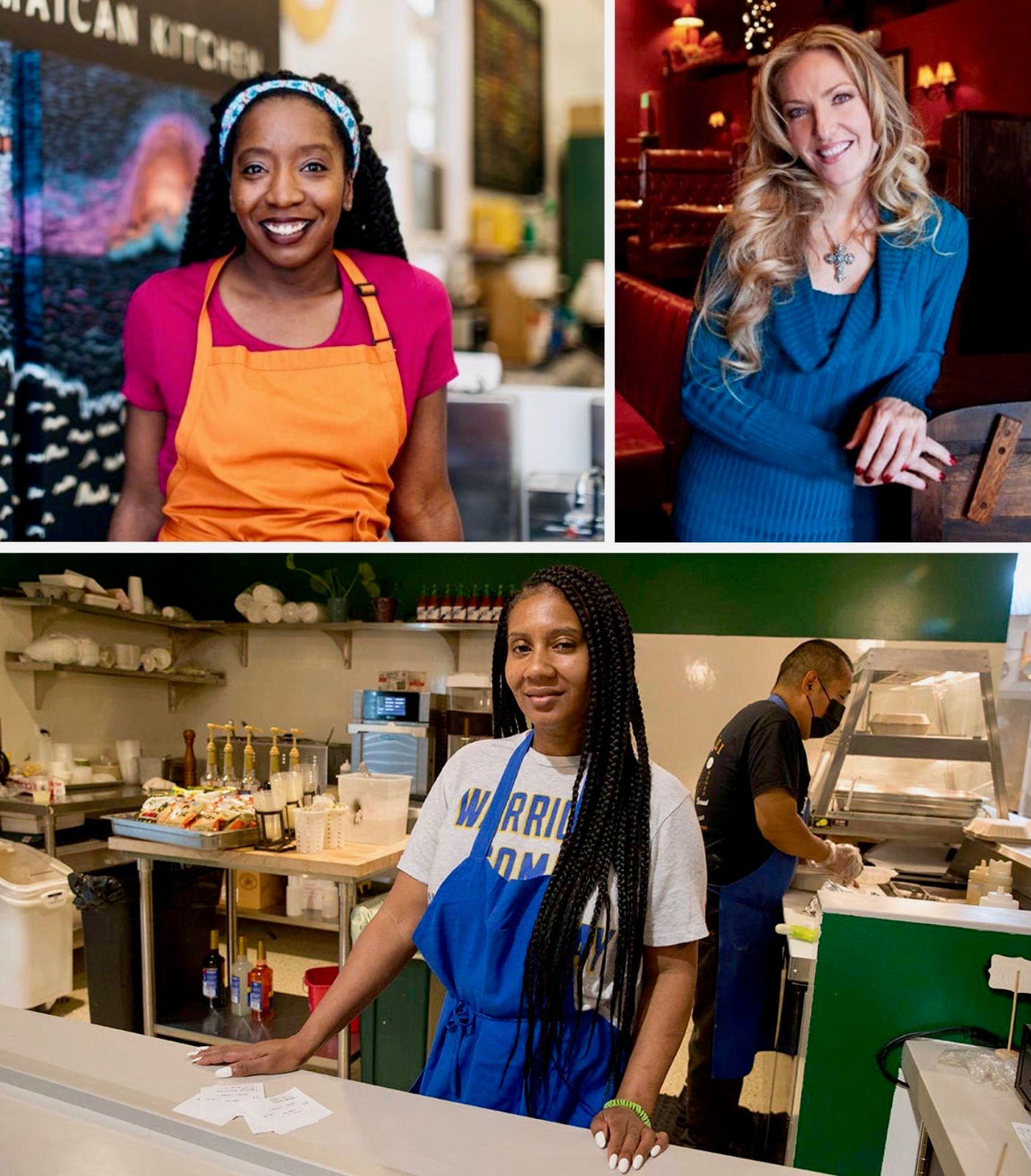In the current era of food obsession and upscale everything, the people behind the food have become just as compelling as the cuisine. Food shows and documentaries tend to focus on the personal trials and tribulations of chefs, and the culture and heritage that forged their food. If you're not hungry and crying after an episode of Chef's Table or Top Chef — which is to say that you're invested in the humanity of the cooks — then you're missing out on a key, modern ingredient.
In late November, Chase Center and the Golden State Warriors invited a few writers to sample new dishes from the Taste Makers, a group of small, local eateries operating inside the 18,000-seat arena. Though my love for all things Warriors is well documented on this website, I was taught to be wary of stories pitched by big businesses, and to eschew promotions.
But as we arrived at the Modelo Cantina Bar, a ticketed area in the high altitude of Chase Center that feels like a rooftop restaurant, I grabbed a new-to-the-menu spicy pineapple margarita. (Delicious.) It was my first time being in the building, and though the Warriors' hardwood had been removed for an upcoming concert, the allure of the venue was undeniable. It would be the exceptional people spotlighted at the tasting, however, that superseded my concerns about covering a promotional event.
Donna Daniels, the General Manager of Chase Center, welcomed the small group of journos on hand. "I might get a little emotional talking about the Taste Makers," said Daniels, speaking of the five business owners/chefs on hand.
I sat down with Kristen Brillantes and JP Reyes, the owners of the Sarap Shop, a Filipino food business, as well as Kyrie Sismaet, an editor with San Francisco Magazine. As the rounds of delicious samples were served, Kristen immediately gravitated toward the humanity, and a new business ethos behind the food: "Historically, mom and pop shops are 24/7, overextending environments for a variety of challenging reasons. We were conscious of designing a business model that fit our lifestyle and values first, building beyond stability and focusing heavily on safe expression, personal development, and modern team skills," Kristen said. "We wanted to build and maintain a healthy environment, a place where people can process their past experiences and open themselves up to new experiences that stretch what they believe they are capable and deserving of."

"We often see work environments that expect people to unconsciously adopt past scarcity-driven practices and accept its negative, often traumatic, effects," Kristen continued. "We wanted to build something that moves us beyond that structure and mindset, something that can handle the tension that comes from running an independent, small business and still be creative, compassionate, and fun.
"When we're thinking about being first-generation entrepreneurs, we're thinking about that — I wanted work to feel different in this new way."
The Taste Makers gave small presentations of their new dishes at the November event. Shani Jones, chef/owner of Peaches Patties in The Mission, talked about the sweet fried Jamaican plantains on the menu. (Delicious.) "Where else can you get Jamaican food at a sporting event in America?" Jones wondered. Her mother, a Kingston, Jamaica, native who went by 'Peaches,' is the namesake for the restaurant, the San Francisco Chronicle wrote.
Tiffany Carter, the owner of Boug Cali, called herself a "rebel chef" who is unbounded by tradition. "I just wanted to be in Mission Bay, on the water, and to see representation for my community," said Carter, who's a native of Bayview, just south of Chase Center. Boug Cali's shrimp po boy, served on a Hawaiian roll (it was delicious), represented a mix of her bucking of tradition and her Creole-inspired cooking. Boug Cali also has a location in the La Cocina Municipal Marketplace in the Tenderloin.
Teresa Goines worked as a juvenile correctional officer before opening Old Skool Cafe in Bayview. The international soul-food restaurant is a faith-based, violence prevention program that provides job training and employment for at-risk, formerly incarcerated and foster care youth. Old Skool rolled out their braised short-rib sandwich, and as you might have guessed, it was absolutely delicious.

Reyes and Brillantes of the Sarap Shop were introducing their delicious "Inihaw" or BBQ chicken skewer. "It's flavors are based on memories of our childhood summers in the Philippines eating grilled chicken and grilled corn," JP said. (The Sarap Shop will soon have a brick-and-mortar location in the SOMA Pilipinas cultural district.)
"We were a little hesitant to apply for Taste Makers," Brillantes told me. "We thought there was no way they would pick us. We didn't have the kind of financing. But we were encouraged to apply by one of our mentors, and drew on our excitement as Bay Area kids. [Kristen and JP are longtime Warriors' fans.] We were transparent about what we stood for and what we could do."
The Golden State Warriors had partnered with Levy Restaurants and the Palo Alto-based Bon Appétit Management Co. in 2017 to craft the future Chase Center's Taste Makers program. The goal was to bring small, locally-owned and diverse food vendors into the brand new arena in late 2019.
"When you're a smaller and more community centered business, you're not coming in with investors and generational wealth — we didn't have that kind of horsepower," Kristen told me. "[The Taste Makers program] gives everyone a shot at operating on a national platform, without the financial pressure of a big build-out or lease. I believe it's one of the first corporate programs that doesn’t put the financial burden and risk on a small, family-owned business."
Brillantes said that in the Bay Area, there's broad, growing support, both among developers and consumers, for highlighting a new generation of mom-and-pop shops as opposed to leasing space to ubiquitous corporate chains. "Consumers are finding ways to advocate for what they want to see built in their neighborhood, and big companies want to find a way to bridge the gap — I've seen some developers subsidize the buildout of a new restaurant space and work out a deal that if you break the lease, you're not stuck with the costs."
When Chase Center's 2019-2020 inaugural season was cut short, Brillantes said that "the Taste Makers program volunteered marketing resources to participants to help us all try and stay afloat." During the pandemic, Jessica Rohrig, the marketing manager at Chase Center for Bon Appétit, offered a wide range of assistance, right down to helping deliver food for their meal-kit service.
"It's one of the most human programs I've gotten to be a part of," Kristen said. "The people behind it genuinely care and are really down."

Please forgive the brash simplicity of this description, but everything I ate Chase Center was delicious — I'll quote Anthony Bourdain and say it was "amazingly delicious" with "layer after layer after layer of awesome." Every bite had multiple textures and flashes of flavor and fresh ingredients. The food was cooked and assembled with love and skill, and if you're in the mood to consider the larger context, then each dish tells a story about the people who conceived it.
"Our family's palate loves big, bold flavors," Kristen said. "That's the way we approached our menu at Chase, offering some of our favorite Filipino and Bay Area dishes, and giving a little twist for a good game-time experience."
The Sarap Shop did their take on one of the most traditional of sporting-event foods, the hot dog, using longanisa, a sweet, garlic-y Filipino breakfast sausage that's a cousin to chorizo. "It's our way of integrating our culture into one of San Francisc's classic late-night eats, the dirty dog," Brillantes said. She called lumpia — a type of spring roll — the "gateway" to Filipino food. Lumpia Shanghai is commonly made with pork, "but since Chase may the first time someone is having Filipino food, we made a vegan Lumpia Shanghai that's just as addicting," Kristen said, explaining that she wanted to have an inclusive menu where everyone, from plant-based eaters to meat lovers, can look forward to something to enjoy.
In 2016, JP Reyes and Kristen Brillantes were doing pop ups restaurants; Kristen's mother was in the kitchen with JP, while JP's mother was working the front of the house with Kristen. "JP was just starting out as a mostly self-taught chef (we couldn't afford to send him to culinary school), and he had gotten into vegan food," Kristen said. "At the time, a lot of the options available weren't that culturally inclusive. He wanted to create bold flavors of our memories with vegan ingredients.
"We had good responses to our pop ups. Our moms were pressuring us to get married, so we explored the option of opening a food truck together instead, which cost as much as a wedding."

During the Taste Maker's presentation, Kristen spoke about the unique experience of serving people "who have never interacted with your culture's food before."
"We've seen a pretty good reception of the dishes, especially now that we're in the general public area," Kristen said. The Sarap Shop had been in the private "United Club" at Chase Center, but moved to the sixth floor, portal 49, this season. "Filipinos are the largest Warriors fan base, and many Filipino people work at Chase across all departments. To this day, we still pinch ourselves that we have the opportunity to help our community feel seen at the arena."
Kristen said that Filipino food is inherently fusion based because "the Philippines has had so many occupiers. There is no single way to enjoy it, as long as you're enjoying it with positive, community-centered intentions and integrity. We hope people take away the playful creativity, joy, and sense of belonging that is at the core of Filipino food and culture."
Top Photo: The Sarap Shop

